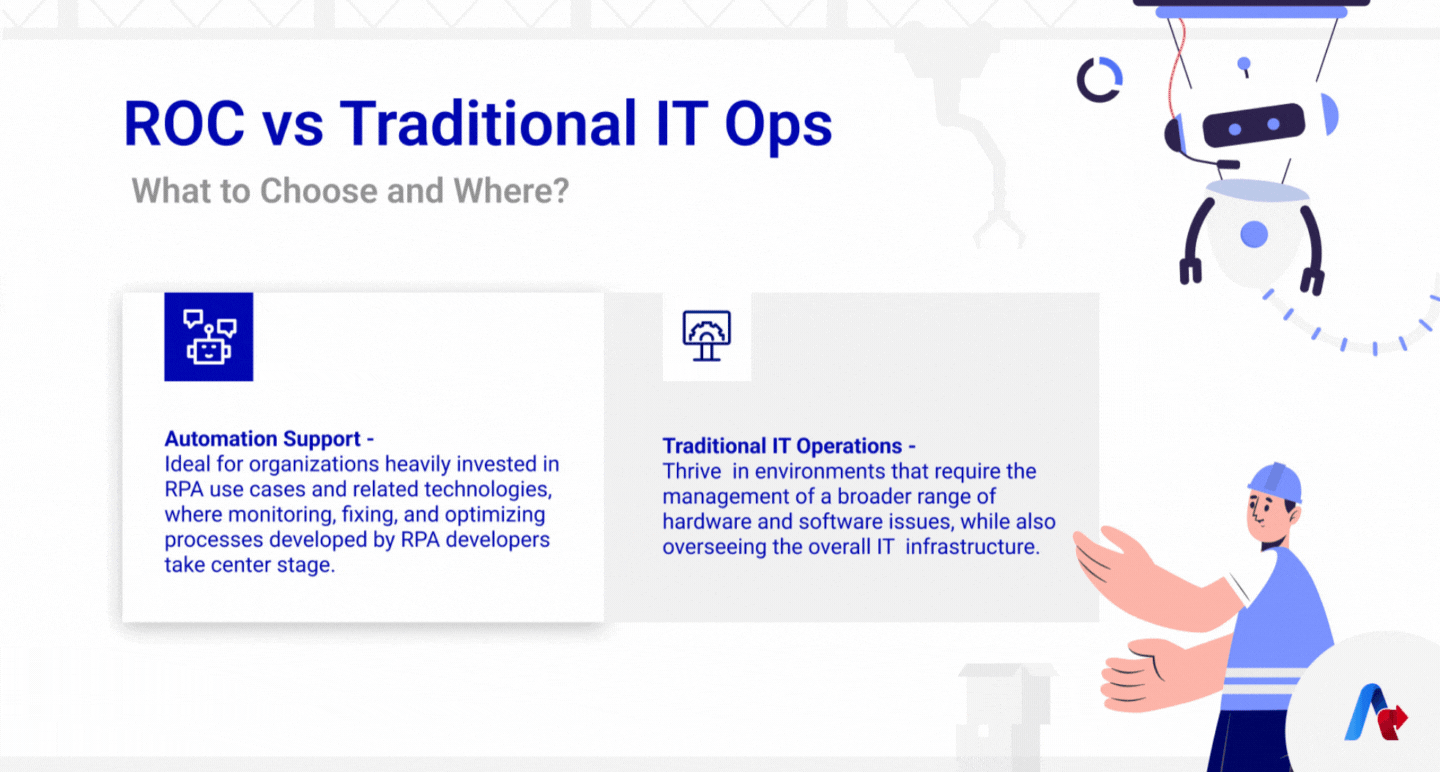In the ever-evolving world of technology, businesses are constantly seeking ways to enhance efficiency, cut operational costs, and improve service quality. The backbone of achieving these goals lies in the capabilities of technology support roles, which can be approached in two ways: Traditional IT Operations and emerging Automation Support. These approaches play a significant role in shaping the business of an organization.
Robotic Operations Center (ROC)
Before delving into the comparison between Traditional IT Operations and Automation Support, let’s first comprehend the concept of Robotic Operations Center (ROC). This dynamic hub oversees, maintains, and enhances automated workflows within an organization. These processes, often powered by Robotic Process Automation (RPA) and other cutting-edge technologies, streamline operations, reduce errors, and boost efficiency.
Traditional IT Operations: Behind the Scenes Heroes
Traditional IT Operations teams are the unsung heroes, ensuring the functionality and reliability of an organization’s tech backbone. that the technology backbone of an organization remains functional and reliable. Professionals in this domain handle a wide range of tasks, including troubleshooting, system maintenance, and customer support. They diagnose and resolve issues, ensuring that technological disruptions are minimized. Here are some examples of what their responsibilities encompass.
Focus Areas of IT Operations:
On-Premises Infrastructure
Managing servers, networking hardware, and storage devices within organizational facilities.
Incident Management
Handling incidents reported by end-users, categorizing them, prioritizing, and assigning them to the appropriate IT support teams for resolution.
Service Desk Operations
Fulfilling specific service needs through predefined processes, such as software installations, password resets, and access permissions.
Change Management
Carefully managing changes to IT systems and infrastructure, ensuring minimal risks and disruptions in multiple RPA use cases.
Automation Support: Navigating the New Frontier
In contrast, Automation Support teams focus on managing and optimizing automated processes, with responsibilities such as:
Focus Areas of Automation Support:
Monitoring
Ensuring the successful completion of scheduled or manually triggered automations through tools that monitor email alerts, process logs, and automation status.
Incident Management
Handling automation issues from end to end, keeping stakeholders informed of process status.
Change Management
Managing changes to bots or automations already in production, evaluating their impact and benefits.
Data Visualization
Creating visual representations of support tasks, incidents handled, automation productivity, and KPI metrics like ROI and time saved.
Robotic Operation Center Vs Traditional IT Operations
Let’s break down the difference between these two approaches to provide you with a better understanding of which path might work best for your organization.
Implementation Speed
Robotic operation center offers a significant advantage over traditional IT operations- it delivers high impact faster. While traditional IT operation methods might take months or even years to achieve cost savings and improve manual tasks, RPA technologies can replicate these improvements in just weeks, providing quicker benefits and allowing businesses to reap rewards sooner.
Expenditure and Savings
Large-scale deployments of Robotic Process Automation aren't just about cutting costs; they offer a substantial return on investment. Consider a company deploying 500 bots at a total cost of $20 million. By automating tasks currently performed by 1,000 employees, this company could potentially see savings of $100 million demonstrating the financial benefits of RPA on a larger scale.
Built-in Control and Management
RPA streamlines control with out-of-the-box monitoring, reporting, and system controls. Unlike traditional operations where controls often need to be custom-built, RPA provides features like scheduling customization, queue creation, email notifications, and response-triggered actions right from the start. This translates to effortless oversight and a smoother transition to automated processes.
Data Visualization
Creating visual representations of support tasks, incidents handled, automation productivity, and KPI metrics like ROI and time saved.
How much time and effort could your organization save with these built-in features?
Tell us!
Traditional RPA Services vs RPA Managed Services
Bridging the Gap: Understanding the Difference with Appropriate Use Cases
Now that we understand the core functions of both Traditional IT Operations and Automation Support, let's explore when one might be more appropriate than the other:

How does your organization's focus align with these two approaches? What benefits or challenges do you anticipate in this alignment?
Let's discuss with Experts
Building the Right Team
In closing, it's important to highlight the critical importance of assembling the right team for these support functions. While both Traditional IT and Automation Support teams share skills such as problem-solving, communication, and technical expertise, there are key differences:
Automation Support teams require a deep understanding of RPA technologies and process automation to work with different RPA use cases.
Traditional IT teams need expertise in managing diverse IT infrastructure components.
As businesses strive to stay competitive in an Industry that is constantly changing, understanding the roles and nuances of Automation Support and Traditional IT Operations is crucial. By leveraging the strengths of each approach, organizations can optimize their technology support functions to achieve greater efficiency and success. Embracing these changes is the key to a brighter, more automated future.
Ready to embark on a more automated future with confidence? Explore the possibilities with us and let our robotic process automation consultants assist you on the next steps with personalized insights and tailored solutions.